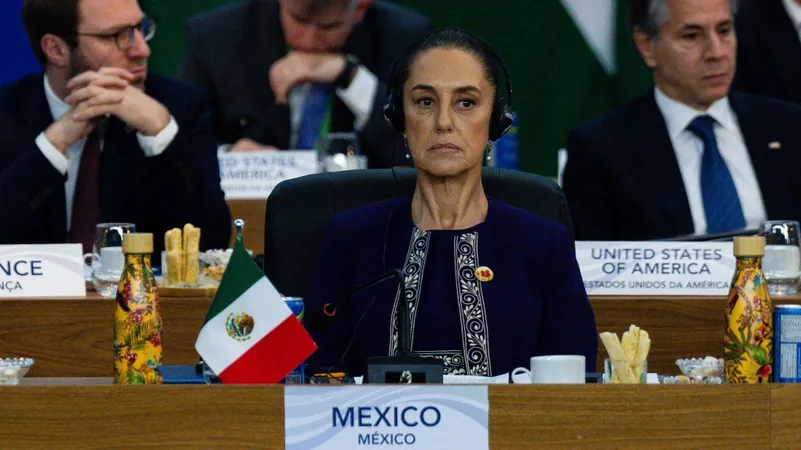
Mexican President Highlights Canada’s Serious Fentanyl Crisis Amid Diplomatic Tensions
2024-12-03
Author: Michael
Mexican President Claudia Sheinbaum's Statement
In a recent diplomatic exchange, Mexican President Claudia Sheinbaum asserted that Canada is grappling with a severe fentanyl consumption issue, potentially more so than Mexico itself. This statement comes amidst a backdrop of rising tensions between the two North American countries, primarily fueled by criticisms from Canadian officials regarding border security and drug trafficking.
Canadian Response to Sheinbaum's Remarks
Foreign Affairs Minister Mélanie Joly took a measured approach when addressing Sheinbaum's comments, emphasizing the importance of private diplomacy. She stated, “I fundamentally believe that many conversations, when it comes to diplomacy, are always better when they remain private.” Joly, speaking from Brussels, highlighted ongoing efforts to maintain a cooperative relationship with Mexico while discussing significant trade agreements that affect all three North American neighbors: Canada, Mexico, and the U.S.
Rising Tensions and Trade Discussions
The friction between Canada and Mexico intensified after concerns over U.S. President-elect Donald Trump’s intentions to impose tariffs unless both countries tackle the issues of illegal drugs and migration effectively. In response, Canadian leaders, including Prime Minister Justin Trudeau, sought to clarify that the challenges at the U.S.-Canada border differ significantly from those faced at the U.S.-Mexico border.
Political Motives in Framing Issues
Sheinbaum remarked that Canada’s framing of the issues might be driven by political motives, stating, “Mexico should not be used as part of (Canadian) electoral campaigns.” She underscored the historical and cultural richness of Mexico, referencing civilizations that have existed for thousands of years.
Complex Canada-Mexico Relationship
Experts believe that complex dynamics shaped the Canada-Mexico relationship, particularly during the recent renegotiations of trade agreements like CUSMA, which replaced NAFTA. Christopher Sands, director of the Canada Institute at the Woodrow Wilson Center, noted that Canada often found itself on the outside looking in during negotiations, as Mexico appeared willing to assert its independence.
Fentanyl Crisis as a Public Health Concern
The chemistry between the three countries remains crucial as they seek to address mutual challenges, including trade and security. The Mexican government's actions, which some argue lean towards nationalism and include contentious relationships with drug cartels, complicate the trilateral cooperation dynamic.
Ongoing Drug Trafficking Issues
Amid these diplomatic struggles, the ongoing fentanyl crisis poses a significant public health concern for Canada. The opioid epidemic, exacerbated by the availability of synthetic opioids like fentanyl, highlights the urgent need for cooperative strategies among North American nations to combat drug trafficking and enhance public safety.
Future of Canada-U.S.-Mexico Relations
As the political landscape evolves leading up to the 2026 review of the Canada-U.S.-Mexico Agreement, discussions and negotiations will play a pivotal role in determining the future of these partnerships. Prime Minister Trudeau's government faces the challenge of addressing domestic concerns while navigating complex relationships with both Mexico and the U.S.
Conclusion
Stay tuned as this story develops—what will be the next chapter in North America's diplomatic saga?









 Brasil (PT)
Brasil (PT)
 Canada (EN)
Canada (EN)
 Chile (ES)
Chile (ES)
 España (ES)
España (ES)
 France (FR)
France (FR)
 Hong Kong (EN)
Hong Kong (EN)
 Italia (IT)
Italia (IT)
 日本 (JA)
日本 (JA)
 Magyarország (HU)
Magyarország (HU)
 Norge (NO)
Norge (NO)
 Polska (PL)
Polska (PL)
 Schweiz (DE)
Schweiz (DE)
 Singapore (EN)
Singapore (EN)
 Sverige (SV)
Sverige (SV)
 Suomi (FI)
Suomi (FI)
 Türkiye (TR)
Türkiye (TR)